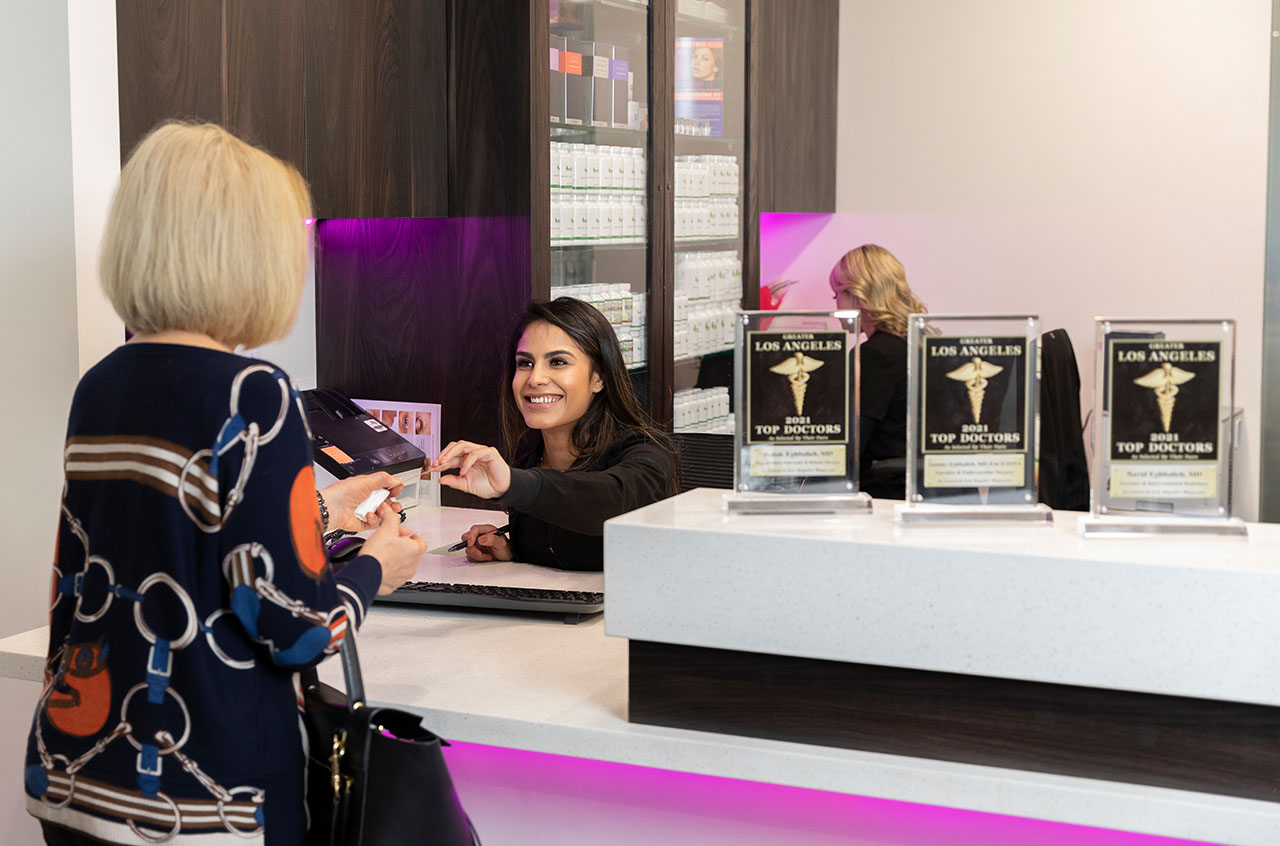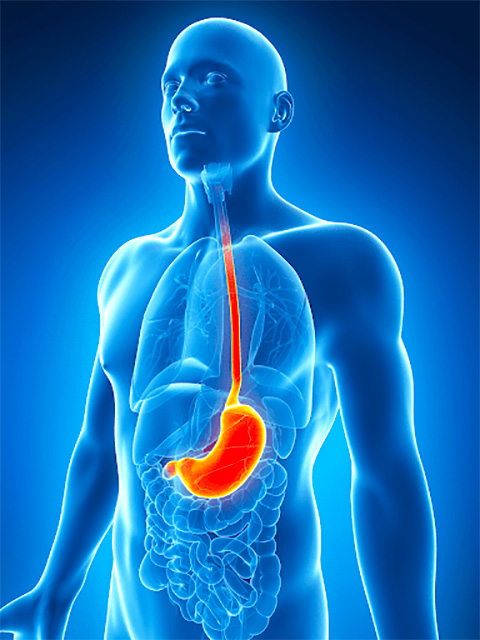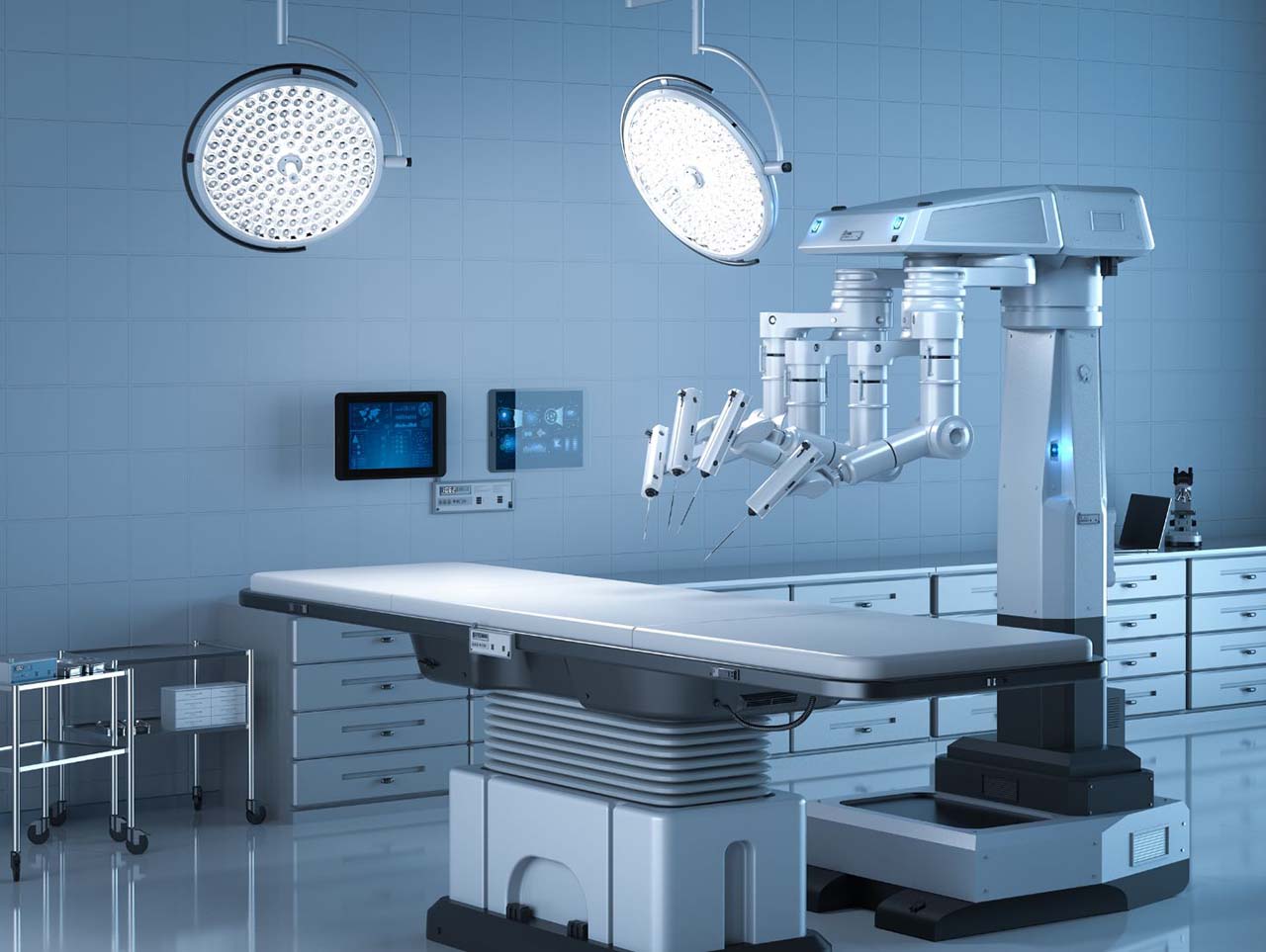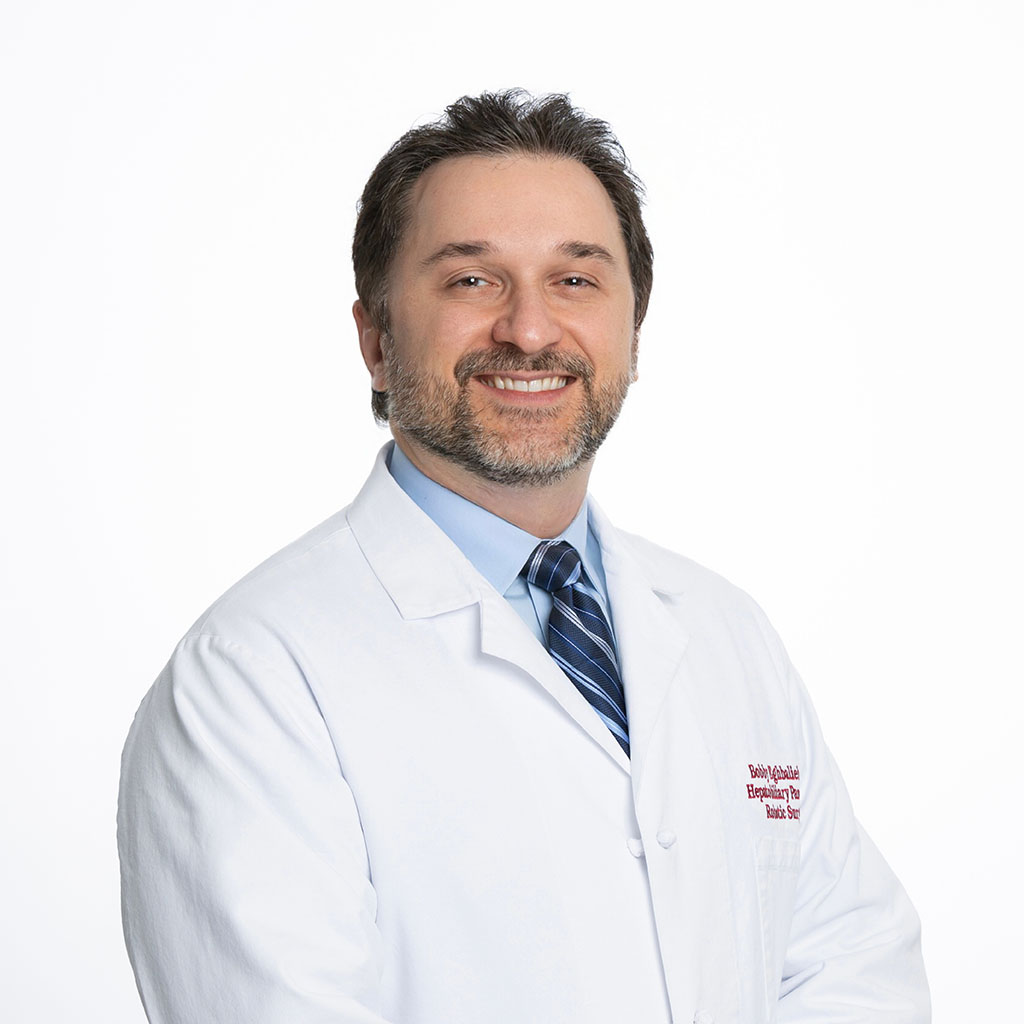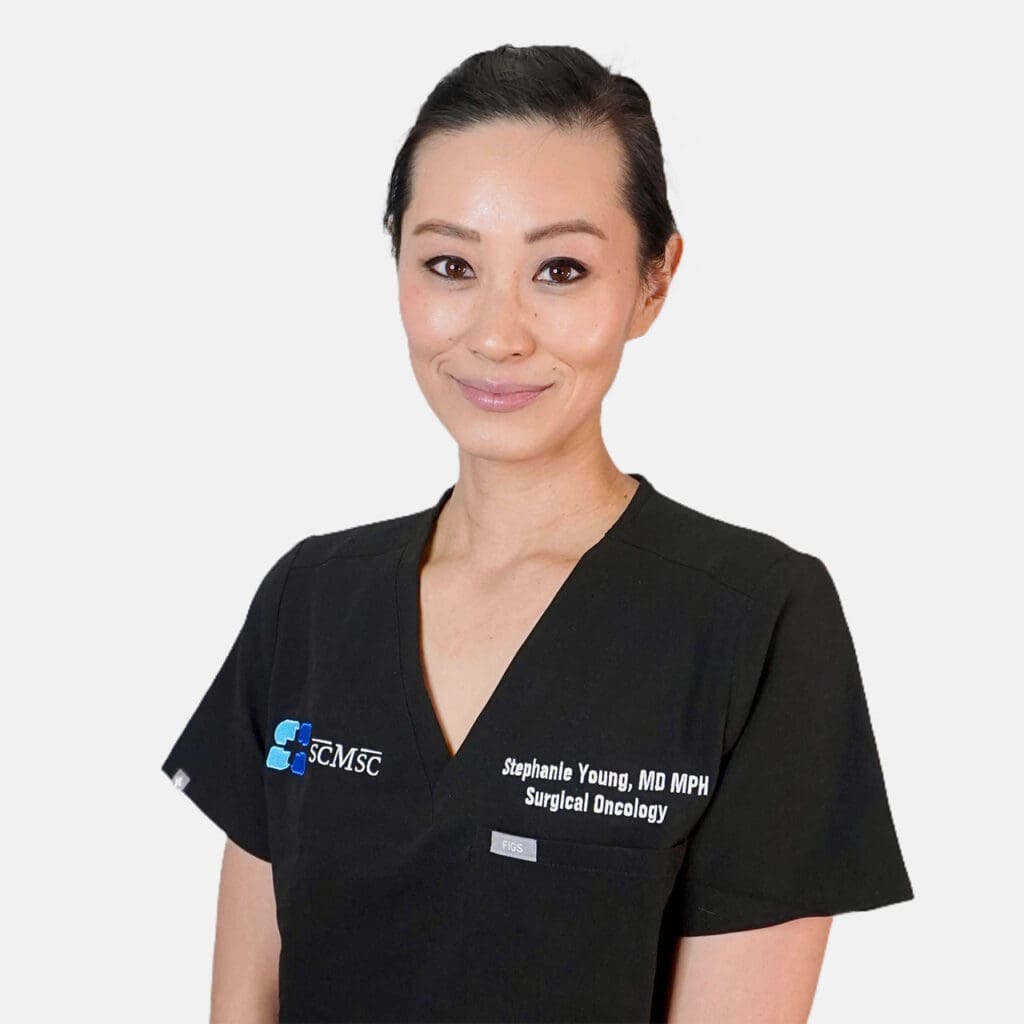Stomach Cancer Surgeon, Los Angeles
Robotic Surgery for Stomach Cancer
What is Stomach Cancer?
Stomach cancer, sometimes referred to as gastric cancer, is a rare form of cancer. The cancer cells form tumors on the inside wall of the stomach.
Stomach Cancer Q & A
What causes stomach cancer?
You may also be at a higher risk for stomach cancer if you have a family history of gastric cancer, eat salted and cured foods, have chronic inflammation of the stomach, smoke tobacco, or have pernicious anemia.
There are several types of stomach cancer:
- Adenocarcinoma: Begins in the innermost lining of the stomach; accounts for 90-95% of stomach cancers.
- Lymphoma: A cancer of immune system tissues found in the wall of the stomach; accounts for 4% of stomach cancers.
- Carcinoid tumor: Cancer that begins in hormone-producing cells in the stomach; accounts for 3% of stomach cancers.
- Gastrointestinal stromal tumor (GIST): Rare cancer that originates in specific cells in the stomach wall.
- Rare stomach cancers: Including squamous cell carcinoma, small-cell carcinoma of the pancreas (SCCP) and leiomyosarcoma (LMS).
- Non-cancerous tumors: Including lipomas and polyps.
What are the symptoms of stomach cancer?
Many of the symptoms caused by stomach cancer are generic and similar to those caused by a variety of health conditions. Be aware of these common symptoms, and don’t hesitate to consult your physician if you have them:
- Bloating, fullness, or pain in the abdomen
- Excessive belching
- Loss of appetite
- Weight loss
- Nausea
- Difficulty swallowing
- Weakness and fatigue
- Dark Stools
- General decline in health
- Vomiting blood
How is stomach cancer treated?
What are the benefits of robotic surgery for stomach cancer?
For many years, gastrectomy was done using standard open surgery. Then laparoscopy, or minimally-invasive, surgery was developed. This type of surgery uses a few small incisions and specialized surgical instruments to remove the cancerous part of the stomach with less risk and a quicker recovery than open surgery.
You can have confidence in Dr. Eghbalieh’s years of experience performing laparoscopic gastrectomies. However, Dr. Eghbalieh offers more — he also specializes in minimally-invasive robot-assisted surgery.
As Dr. Eghbalieh controls the robot-assisted instruments, he has a high-definition 3D view of the stomach. The flexible movement of the robotic arms allows Dr. Eghbalieh to operate with greater precision and better range of motion. Robotic surgery also gives the doctor the ability to get to areas that are hard for human hands to reach. Ultimately, robotic surgery provides optimal results, but only in the hands of an experienced surgeon like Dr. Eghbalieh.
Robotic Surgery Q & A
What is robotic surgery?
It takes extensive training and years of experience to master this advanced technology. In fact, it’s such a specialized field that Dr. Eghbalieh is one of a very small number of physicians in the United States offering the type of complex robotic surgeries that he expertly performs.
What are the benefits of robot-assisted surgery?
Robot-assisted surgery is achieved using the da Vinci® Surgical System, which performs laparoscopic, or minimally-invasive surgery through a few small incisions. The robotic system extends the surgeon’s reach, making it possible to perform surgery in hard-to-reach areas with minimal distress to surrounding tissues.
The robotic device perfectly complements Dr. Eghbalieh’s surgical expertise, adding benefits such as:
- Visualization: 3D, high-definition, and zoom capabilities give the doctor excellent visual clarity and the ability to see details of the tissues in small, confined surgical areas.
- Enhanced dexterity: The narrow robotic arms are built with fingertip control, a range of motion, and extended length that exceeds human capabilities.
- EndoWrist™ Instruments: Transform the surgeon’s wrist, hand, and fingers into tiny surgical instruments that can work inside the body in spaces too small to accommodate a hand.
- Excellent precision and control: The enhanced dexterity combined with motion scaling that eliminates normal physiologic tremors allows the robot to seamlessly execute the doctor’s motions.
- Improved ergonomics: Dr. Eghbalieh can perform surgery while seated, which reduces fatigue and provides optimal coordination between hands and vision.
Robotic Treatment of Gastric/Stomach Cancer, Pancreatic Cancer, Liver Cancer and Colorectal Cancer
Dr. Babak Eghbalieh at Southern California Multi-Specialty Center is a board-certified general surgeon and a leading national expert in robotic surgery and laparoscopic surgery. He is the #1 robotic surgeon in all of Los Angeles and San Fernando Valley, having performed more robotic general surgery than any other surgeon in all of Los Angeles.
He provides personal attention to patients needing surgical treatment for diverse conditions, from gallstones and robotic hernia repair to robotic colorectal, pancreatic, liver, and stomach cancers.
He is the leading Robotic Hepatobiliary and Robotic Pancreatic surgeon with extensive experience in Robotic Whipple procedure. Dr. Eghbalieh sees patients throughout the Southern California area, with offices in Sherman Oaks, Porter Ranch, Valencia and a new office opening in Tarzana in the near future.
What type of robot-assisted surgery does Dr. Eghbalieh perform?
Dr. Eghbalieh is an experienced general surgeon with specialized training in cancer surgery, robotic surgery, and advanced laparoscopic surgery. Most of the surgeries he performs are robotic, including:
- Hepatobiliary pancreatic surgery: treats cancers of the liver, gallbladder, bile duct, and pancreas (Robotic Whipple Procedure)
- Splenectomy: spleen removal due to injury, cancer, or other health problems
- Colorectal surgery: colon and rectal cancers, colonic polyps
- Complex hernia repair: robot-assisted surgery to treat inguinal, incisional, umbilical, hiatal, and ventral hernias
- Gastrectomy: to treat stomach cancer as well as other ulcers
- Small bowel resection: for cancer and other problems with the small intestine
- Pelvic and groin lymphadenectomy: treat metastatic melanoma
- Heller myotomy: to treat disorders of the lower esophageal sphincter
If you need surgery, contact Dr. Eghbalieh for a consult and customized treatment plan.
Make an Appointment
Your health journey, especially with something like stomach cancer, may seem daunting. But remember, you’re not alone. The SCMSC team in LA is always here, blending professional expertise with a touch of human understanding. Let’s face stomach cancer together.
To schedule an evaluation with Dr. Eghbalieh or Dr. Young at Southern California Multi-Specialty Center, call 818-900-6480.
Make an appointment at SCMSC
We look forward to welcoming you
Schedule an evaluation with Dr. Eghbalieh or Dr. Young at Southern California Multi-Specialty Center.
